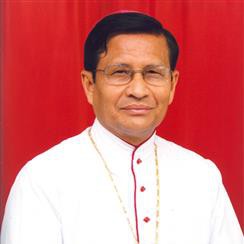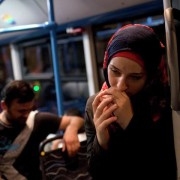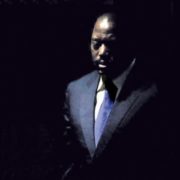 Il cardinale Charles Mayng Bo, arcivescovo di Yangoon, ha sollecitato Aung San Suu Kyi a prendere parola in difesa delle decine di migliaia di rohingya musulmani che stanno lasciando il Myanmar, ma nello stesso tempo condanna la “stigmatizzazione” della leader di fatto del Paese.
Il cardinale Charles Mayng Bo, arcivescovo di Yangoon, ha sollecitato Aung San Suu Kyi a prendere parola in difesa delle decine di migliaia di rohingya musulmani che stanno lasciando il Myanmar, ma nello stesso tempo condanna la “stigmatizzazione” della leader di fatto del Paese.
In un’intervista rilasciata via email alla rivista Time, ha detto: «La gente nello Stato di Rakhine (dal quale i rohingya stanno fuggendo in Bangladesh) sta affrontando una sofferenza immensa. Il mondo guarda ad Aung San Suu Kyi con le stesso sguardo con il quale puntava a lei durante la battaglia per la democrazia. Ora è parte del governo, è un leader politico. Certo avrebbe dovuto prendere posizione».
Tuttavia – precisava – la democrazia è molto fragile in Myanmar e stigmatizzare il Nobel Aung San Suu Kyi – fatta segno di critiche da più parti per non aver preso posizione a difesa dei rohingya – non porta a niente. «Aung San Suu Kyi sta camminando sul filo del rasoio – ha detto il cardinal Bo – . Forze oscure stanno ancora chiedendo a gran voce un ritorno dell’esercito».
«Stigmatizzare Aung San Suu Kyi e attaccarla sui media non è una soluzione di ampio respiro. Un passo falso, e lei sarebbe fuori dal governo, e ciò sarebbe la fine di ogni sogno di democrazia. Dobbiamo sempre ricordare che l’esercito ha sopraffatto la democrazia tre volte nella storia di Myanmar».
Più di 300.000 musulmani sono fuggiti in Bangladesh da Rakhine da quando l’esercito del Myanmar ha cominciato a perseguire attività militanti.
Benché Aung San Suu Kyi sia stata eletta democraticamente nel 2015, i militari continuano a controllare i ministeri chiave del governo, inclusi la Difesa, gli Interni e gli Esteri.
Il cardinal Bo ha detto che la comunità internazionale dovrebbe guardarsi dal descrivere quanto sta avvenendo come genocidio. «In un simile contesto, è più sensato al momento non qualificare la situazione come genocidio o “pulizia etnica” nei confronti della comunità musulmana, che il governo non riconosce come nazionalità etnica ma solo come gruppo di intrusi dal Bangladesh», ha detto il cardinal BO a Time. «È importante cercare di sciogliere la tensione e il rancore nella regione, e far uso di un linguaggio non partigiano».
Ha aggiunto che il Myanmar ha problemi non solo nello Stato di Rahkine, ma anche in Karen, Kachin e Shan. «Questi conflitti hanno generato migliaia di profughi interni e di rifugiati», ha detto il cardinal Bo.
Aung San Suu Kyi ha cancellato un viaggio programmato all’ONU a New York la prossima settimana, e ha lamentato le “fake news” che soffiano sul fuoco della crisi.
Papa Francesco sta per recarsi in visita in Myanmar e Bangladesh in novembre. Ha parlato più volte a sostegno dei musulmani rohingya. Il giorno prima dell’annuncio vaticano del suo viaggio, papa Francesco ha fatto appello alla fine della «persecuzione delle minoranze religiose, i nostri fratelli e sorelle rohingya», e ha chiesta che venga loro riconosciuta la «pienezza dei loro diritti».
[Il testo è stato pubblicato su The Tablet il 14 settembre a firma di James Roberts; vedi qui di seguito]
Aung San Suu Kyi should speak out for Rohingya – but stigmatising her needs to stop, says cardinal Bo
14 September 2017 | by James Roberts
«A false step will see her [Aung San Suu Kyi] out of government and that would be the end of any dream of democracy».
Cardinal Charles Mayng Bo, Archbishop of Yangon, has urged Aung San Suu Kyi to speak out in defence of the tens of thousands of Rohingya Muslims fleeing Myanmar, but at the same time he condemned the “stigmatising” of the country’s de facto leader.
In an email interview with TIME magazine, he said: “The people in Rakhine state (from where the Rohingya are fleeing to Bangladesh) face “immense” suffering. “The world looks at Aung San Suu Kyi with the same lens with which it looked at her during her struggle for democracy,” Cardinal Bo told TIME. “Now she is part of the Government, she is a political leader. Surely she should have spoken out.”
However he pointed out that democracy is still very fragile in Myanmar and stigmatising the Nobel laureate – Aung San Suu Kyi has faced a global wave of criticism for not standing up for the Rohingya – will not solve anything. “Aung San Suu Kyi is walking a tight rope walk,” Cardinal Bo said. “Already dark forces are clamouring for return to army rule.
“Stigmatising Aung San Suu Kyi and attacking her through media is not a long term solution. A false step will see her out of government and that would be the end of any dream of democracy. We should always remember the army took back democracy three times in the history of Myanmar.”
More than 300,000 Muslims have fled to Bangladesh from Rakhine as the Myanmar army has cracked down on militant activity.
Even though Aung San Suu Kyi was elected in a democratic election in 2015, the military still controls key government ministries, including Defence, Home Affairs, and Border Affairs.
Cardinal Bo said the international community should be wary of describing what is happening as genocide. “In this context, it is advisable at this time not to qualify the situation as genocide or ethnic cleansing against the Muslim community – which the government does not recognise as an ethnic nationality but as a group of interlopers from Bangladesh,” Cardinal Bo told TIME. “It is important to try to defuse the tension and anger in the region, and use language that will not rile either side.”
He added that Myanmar has problems not just in Rahkine State, but in Karen, Kachin, and Shan. “All these conflicts threw out thousands as IDPs and refugees,” Cardinal Bo pointed out.
Aung San Suu Kyi has cancelled a planned trip to the UN in New York next week, and has blamed “fake news” for fuelling the crisis.
Pope Francis is to visit Myanmar and Bangladesh in November. He has spoken out repeatedly in support of the Rohingya Muslims. The day before the Vatican announced his trip, Francis appealed for the end of “the persecution of the religious minority, our Rohingya brothers and sisters,” and asked for them to be given “their full rights.”





